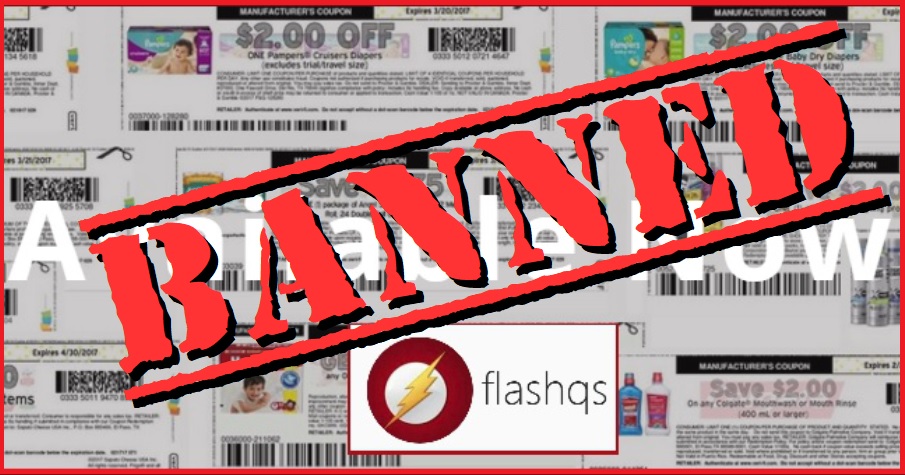In what Coupons.com owner Quotient Technology is hailing as a “sweeping victory”, a federal judge has ordered two “coupon fairies” to pay the company $113,091 in damages, attorneys’ fees and costs, and banned them from ever printing Coupons.com coupons again.
The ruling comes nine months after Quotient sued the Instagram user who went by the name “ipfairy”, and later, “flashqs”. That account holder was among many who discovered a way to bypass Coupons.com’s two-unique-coupon-print limits. And not only did flashqs generate and sell thousands of Coupons.com printables to followers, the account offered for sale a custom-made hack called “Springroll” that allowed buyers to generate their very own unlimited number of unique coupon prints as well.
Quotient later identified “flashqs” as a Texas couple, and accused them of violating state and federal computer fraud acts, misappropriation, unfair competition and breach of contract. As of Monday, flashqs was still selling Coupons.com printables on Instagram. And on Tuesday, a judge found in favor of Quotient and against the defendants.
But while Quotient claims victory, some key legal questions remain unresolved following this, the third major lawsuit involving Coupons.com users who devised ways to circumvent print limits.
The defendants in this case put up a spirited defense. In a motion to dismiss the case, they claimed that users did not have to agree to print limits, or agree not to sell or share their coupon prints, in order to access the Coupons.com site, as Quotient had argued. Furthermore, they claimed that “making changes to one’s own personal computer, deleting registry values, or deleting files on your own computer, is not illegal… Quotient has a problem with the way they store the coupons on their server, as well as the software that is installed enabling the printing of these coupons. A problem that has existed for years.”
But instead of ruling on the merits of the case, weighing Quotient’s arguments against the defendants’, the judge’s decision was ultimately based on something of a technicality – because shortly after filing their motion to dismiss, the defendants completely ghosted the case.
The defendants failed to attend or dial into three successive case management conferences, and the judge was unable to reach them by telephone to find out why, and to where, they had disappeared. Given their “repeated failure to appear in court or otherwise defend the case,” the judge granted Quotient’s request to a judgment by default.
The judge acknowledged that a $113,091 judgment, and banning the defendants from Coupons.com forever, was a “harsh sanction”. But he said the “willfulness and bad faith” of the defendants, who “ceased communication and failed to appear in court, without explanation and despite the Court’s orders to attend,” left him little choice. “While the Court would always prefer to litigate disputes on the merits, there is no indication that defendants intend to litigate at all.”
Unsurprisingly, since the defendants had already ceased all communication with the judge and Quotient, they also did not respond to emailed requests for comment from Coupons in the News.
So while Quotient’s lawsuit did achieve its desired result, the company’s statement upon the resolution of the case contained just a bit of hyperbole. The judge “handed Quotient a complete victory in its suit,” Quotient said in a statement reacting to the outcome. “We have demonstrated our commitment to aggressively fight those who commit coupon fraud,” added Quotient CEO Steven Boal.
Left unsaid was that the judgment was issued not necessarily due to the strength of Quotient’s case, but because the defendants simply stopped showing up to defend themselves.
That’s not to suggest that they were in the right, or that bypassing print limits, exhausting entire supplies of coupons so others can’t access any of them, and profiting off of what Quotient makes available for free, is perfectly okay. But now we’ll never know if the defendants might actually have won the case had it gone to trial, by convincing the court that it was Quotient’s own fault for not having stronger safeguards to prevent the type of activity that the defendants – and countless other “coupon fairies” – were engaging in.
Quotient had previously filed two similar lawsuits that also never went to trial. In April, the company reached a settlement with an Ohio coupon fairy, in which the defendant agreed to a lifetime ban from Coupons.com. And in a much-publicized case back in 2007, Quotient (then doing business as Coupons.com) agreed to settle a lawsuit it brought against John Stottlemire, who modified the coupon printing software he had downloaded in order to circumvent print limits. Like the defendants in the most recent case, Stottlemire argued there was nothing illegal about modifying files on his own computer, and that he had merely exploited a weakness in the Coupons.com software that the company ought to have focused on fixing, instead of suing the person who exposed the problem.
Coupons.com admitted that neither side “won” in the Stottlemire case. But the company declared victory in the two most recent lawsuits, even though all three cases ultimately left unanswered the question of whether the coupon fairies’ actions were actually unlawful.
The defendants in the most recent case still have 30 days to appeal the judge’s default ruling. That assumes they even heed the ruling, since as of this moment, they still have coupons available for sale – all the better to raise $113,091, by continuing to sell as much as they can get away with. But if they do stop selling, and the judgment holds, they and other coupon fairies like them will have learned an expensive lesson about hacking coupon software and selling printable coupons – short-term gain can ultimately lead to some long-term pain.















Interesting outcome! I would venture to say that it is highly unlikely that Quotient will collect even a plugged nickel of that $113K judgment!